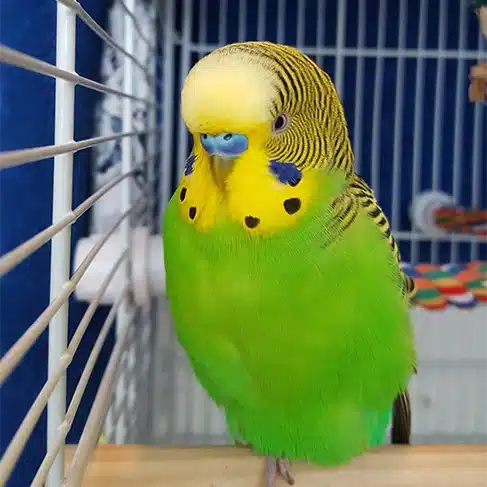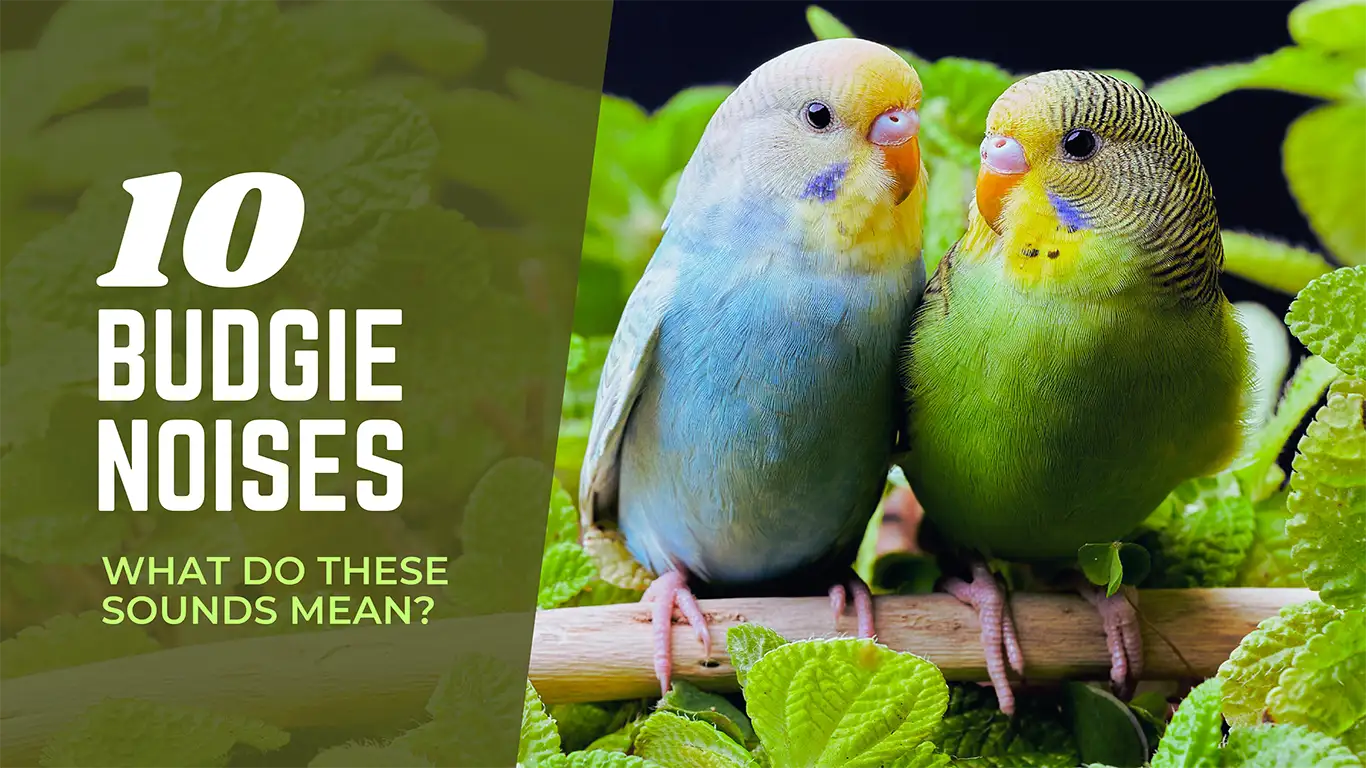Anyone who has budgies as pets is very familiar with all the different noises they make. At some point, you will notice all these noises have a different tone, and it makes you wonder do they mean anything.
Here, we will unveil all the different budgie noises and tell you what they mean. It will surely help you understand your favorite pet a little better and create a strong bond between you and your budgie.
So let’s get started.
Why Do Budgies Make Noises?
Simply put, budgies like to talk and express themselves. They are very vocal about how they are feeling at a given moment.
Since they can’t talk literally like humans, they use different sound tonalities to express their feelings through noises. If your budgie is not talking, then it’s either sick or it’s not quite happy.
Related Post: Why Is My Budgie Chirping So Much?
Another reason for budgies to make a lot of noise is to communicate amongst the flock. And with that talkative nature, it seems like they are very loud as birds.
However, if you can figure out the meaning of these noises, you will enjoy those little chirps, whistles, or even the beak-grinding noises. So, let’s figure that part out very quickly.
10 Types of Sounds Budgies Make And Their Meaning
What you should know about budgies is that all their noises can go under two basic categories. Some noises are signs of positive feelings, while some can be due to expressing negative feelings.
So, whenever your budgie is making noise, make sure to pay attention to what kind of noise are they making. Based on that, you can easily understand your budgie a lot better and communicate with them.
1. Chirping
Almost every budgie in the world will make the chirping noise at some point in their life. It’s the most common sound of a budgie and usually comes in two ways. A budgie can have a happy chirp or an unhappy chirp.
A happy chirping always means that your budgie is satisfied and they are reassuring you about that. Usually, this happy chirp is a very subtle noise with a single chirp.
On the other hand, there is an unhappy chirping where your budgie expresses disappointment. They make this noise when they see new birds, or to get your attention for food and water. The unhappy chirp is a bit loud and insistent.
2. Beak Grinding
While the beak grinding sound may seem like your budgie is not happy, in reality, it’s quite the opposite of that. Whenever a budgie is deeply satisfied with how things are going, and they are just about to go to sleep, it will start grinding its beak. Pretty similar to a cat purring.
3. Whistling
Just like you and us, budgies also get bored at times, and that’s when they whistle to entertain themselves. Budgies also tend to whistle as a response to hearing an interesting tune or music.
While most budgies learn to whistle themselves, sometimes you may need to teach them to whistle. Honestly, it’s pretty fun to see your budgie enjoying their time with whistles.
4. Singing
Unlike all the other noises, you can easily understand when your budgie is singing. It’s usually a combination of different tones in different pitches and a much more complex version of noises. Also, budgies sing for quite a while.
There are plenty of reasons for a budgie to sing. They can sing out of boredom, or they can simply try to join any music from the radio. Sometimes they can even start singing to you talking, how fun is that!
5. Mimicking
What makes budgies 10 times more interesting is their ability to mimic sounds. They can mimic all kinds of sounds including human language, other bird noises, or even any instrument noise.
Not all budgies make this noise though. Only the ones who are comfortable with its surroundings and pay a lot of attention to it, make such noises. Also, it shows the intelligence of your budgie to be able to copy any noise.
6. Chattering
Happy budgies are chatterboxes, whenever they are happy and healthy they will talk. The chattering noise is nothing you should ever be concerned about.
If your budgie is chattering near you, try talking back to them as if you are having a conversation. This will create a bond between you and your budgie to make them feel more validated and happy.
7. Chiding
Now, here’s a budgie noise that shows a bit of aggression and expresses concern from your bird. The chiding noise usually translates to a budgie warning their fellow budgies to stay away from them.
They use this sound to avoid fighting and set boundaries within their personal space. You may hear the chiding noise when you have multiple budgies living together. It sounds like a sharp ‘tsk!”.
Whenever you hear this noise, it’s wise to separate the budgies, until they have calmed down and recovered from the situation.
8. Trilling
Trills are pretty much songs but they are much more long drawn, have a lot of variety, and use some interesting notes in between. Budgies make this noise when they are extremely happy and in the mood to sing.
Sometimes they do it while listening to music or enjoying their meal. It’s a sign of a satisfied and happy budgie who is enjoying its life.
9. Squawking
If your budgie is shocked or surprised by something they will make a squawking noise. The sound can be quite harsh, sudden, and sharp. Sometimes it’s also an indication that your budgie is feeling threatened by something. So, whenever you hear the noise, quickly attend to it.
10. Screaming
The screaming noises of a budgie are the most confusing noise out of all. Sometimes a budgie will scream without any reason just to be a little irritating.
However, for the most part, screams mean your budgie is feeling uncomfortable with something or they are very afraid. It can also be due to sickness as well. So, you have to be careful with the screaming noises.
If you hear short screams that your budgie does occasionally, then there is nothing to worry about. But if the screams are long and continuous then immediately look for signs and contact your vet.
Finally, you’ve reached the end of the article.
I hope these 10 budgie noises have helped you understand what they mean. Also, this should help you connect better with your budgie.

I’m Shajid Rahman, a happy owner of 6 beautiful budgies. I take care of this website to share tips, fun facts, and care guides about these birds.
Whether you’re a budgie lover or considering one as a pet, you’ll find helpful info here! I love these cute creatures, so I made this blog for Budgerigar fans. You can expect to get reliable information based on my years of experience. More About Me →

